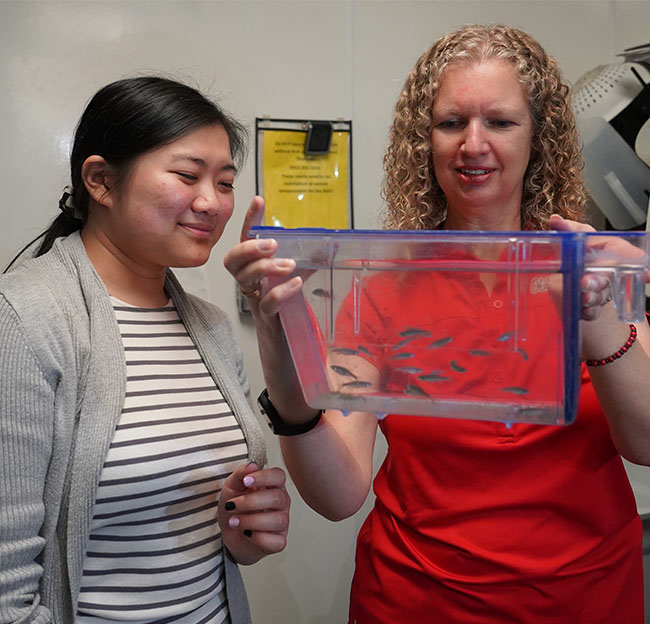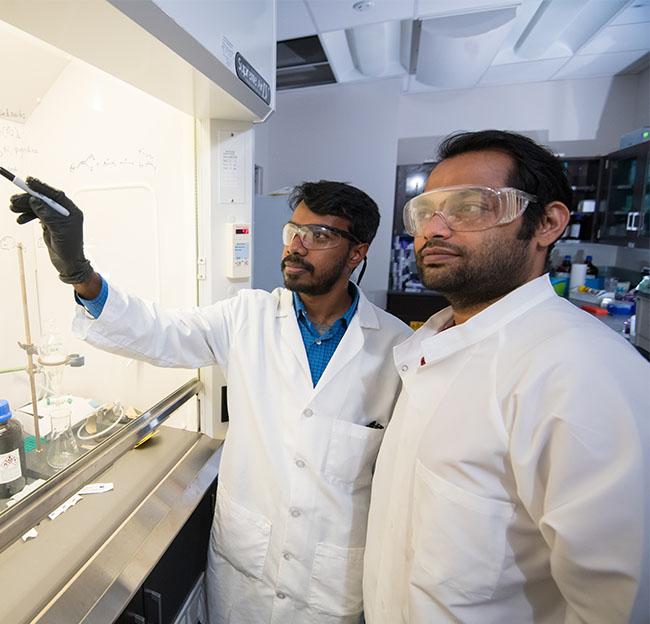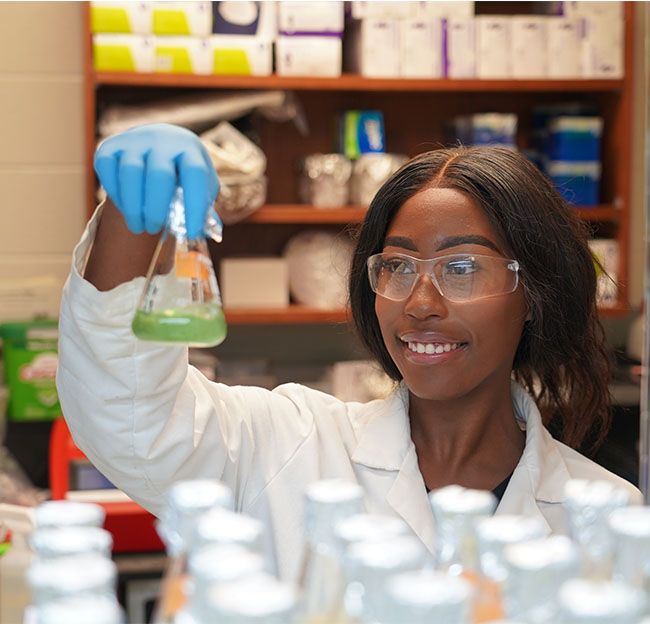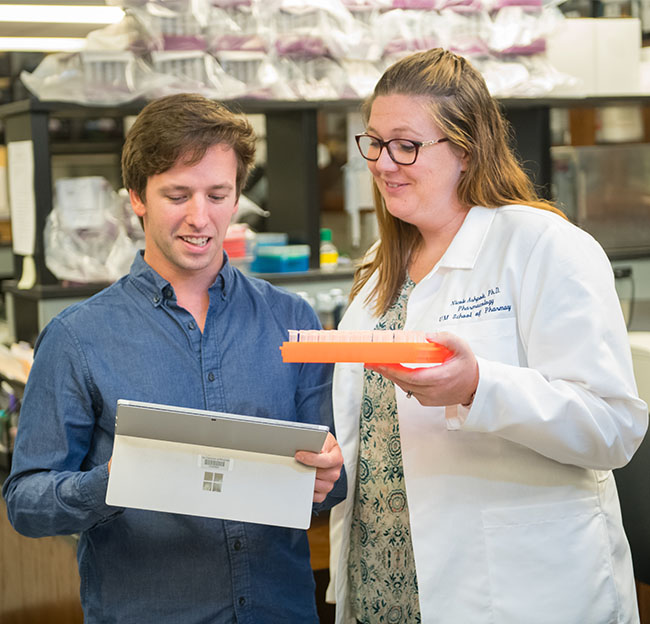BioMolecular Sciences Academics
Learn more about our graduate degree programs and how you can build your legacy in biomolecular sciences.
The Department of BioMolecular Sciences
offers graduate degree programs leading to an M.S. in Dietary Supplements and Medical Cannabis or to an M.S. or Ph.D. in Pharmaceutical Sciences emphasizing Environmental Toxicology, Medicinal Chemistry, Pharmacognosy, and Pharmacology. The graduate curriculum is intended to maximize each student’s talents and facilitate the attainment of the individual student’s professional aspirations.
Our Graduate Programs
Dietary Supplements and Medical Cannabis (Online)
This pioneering program offers a holistic exploration of two rapidly evolving industries, providing comprehensive knowledge from the ground to the consumer. This SACSCOC-accredited program delves into the intricate facets of dietary supplements and medical cannabis, covering their rich history, legislative frameworks, and research and development.

Environmental Toxicology
Environmental Toxicology offers an exciting opportunity for graduate students to dive deep into the study of how environmental contaminants and stressors impact both human health and environmental quality. By engaging in cutting-edge research and immersive coursework, students will gain a profound understanding of these critical issues.

Medicinal Chemistry
Are you passionate about the intersection of chemistry, biology, and pharmaceutical sciences? If so, our Medicinal Chemistry program offers an exciting opportunity to dive deep into this interdisciplinary field. Medicinal Chemistry is at the heart of drug discovery, focusing on the design, synthesis, and study of biologically active compounds, understanding how they work at the molecular level, and uncovering the relationships between their structure and activity.

Pharmacognosy
Are you fascinated by nature's potential to unlock groundbreaking scientific discoveries? Pharmacognosy, or natural products research, delves into the chemistry, origins, and biological functions of small molecules found in nature—whether from plants, animals, fungi, or microbes across various environments, from forests to oceans. This area of study dates back to the earliest herbal remedies developed by indigenous cultures, and continues to play a pivotal role in modern science.

Pharmacology
Are you passionate about understanding how drugs impact the body? Want to be part of a program that combines innovative research with a strong commitment to teaching and service? Then a master’s degree pharmaceutical sciences, emphasizing in pharmacology, is for you.
My Journey
My passion comes to life as I explore the fascinating complexities of molecules and their role in biological systems. The hands-on research opportunities and collaborative environment fuel my curiosity, allowing me to connect with peers from different cultural and educational backgrounds. The environment not only fosters innovation but also emphasizes the importance of unique voices in shaping the trajectory of scientific discovery. What I love most is the unique talents and perspectives, creating a dynamic and supportive space where collective curiosity propels us forward in our scientific endeavors. The professors here are not just educators but mentors who challenge and guide us, helping us navigate the difficulties of research and nurturing our growth as scientists, equipping us with the skills and resilience needed to make meaningful contributions to the field.
Destinee Manning
BMS Student
BioMolecular Sciences Student Advocates - Student Organization
The BioMolecular Sciences Student Advocates is committed to enhancing the graduate student environment by:
- Promoting fellowship and embracing diversity among graduate students
- Improving graduate student experience through leadership development
- Impacting the broader community through public service projects
- Providing an avenue for student-initiated departmental advancement
Forum: BioMolecular Sciences Student Advocates
Contact us: BSA@go.olemiss.edu
BioMolecular Sciences Student Advocates (BSA)
Constitution
ADOPTED: 2-14-2019
REVISED: 5-1-2019
_____ Article I – Name
- Section 1 – The name of this student organization shall be:
BioMolecular Sciences Student Advocates - Section 2 – The abbreviated name or acronym for this student organization shall be BSA. The remainder of the constitution will use BSA and BioMolecular Sciences Student Advocates interchangeably.
_____ Article II – Purpose/Mission Statement
- Section 1 – The purpose of BSA is outlined in the following Mission Statement.
BSA Mission Statement
The BioMolecular Sciences Student Advocates are committed to enhancing the graduate student environment by:
- Promoting fellowship and embracing diversity among graduate students
- Improving graduate student experience through leadership development
- Impacting the broader community through public service projects
- Providing an avenue for student-initiated departmental advancement
- Section 2 – BSA shall abide by all University of Mississippi and Department of BioMolecular Sciences policies and procedures.
_____ Article IV – Membership
- Section 1 – University of Mississippi students must comprise 100% of the student organization’s membership.
- Section 2 – Members of BSA must be full-time graduate students in good standing with the BioMolecular Sciences Department. BSA is open to student from all divisions (Environmental Toxicology, Pharmacology, Pharmacognosy, and Medicinal Chemistry) within the BioMolecular Sciences department.
- Section 3 – Membership in BSA is open to all students meeting the above criteria, irrespective of race, creed, color, gender, class, age, nation of origin, nationality, disability, marital status, religion, veteran status, or sexual orientation.
_____ Article V – Officers/Executive Board
- Section 1 – BSA Officers shall include the following positions and responsibilities:
Overview of BSA Officer Structure
- President: Preside over BSA meetings, coordinate subcommittee chairs of BSA and serves as a student liaison of the BioMolecular Sciences department involving issues with other departments (Pharmaceutics and Pharmacy Administration) within the School of Pharmacy at the University of Mississippi. Serve as the interface between graduate students and faculty by reporting collective student opinions. Aids in the coordination and management of BSA events (Journal Clubs, Skills Workshops, Social Events, Community Outreach Events) with the respective officers. Works with all BSA officers to ensure the success of BSA.
-
- Vice President: Aids in the coordination and management of BSA events (Journal Clubs, Skills Workshops, Social Events, Community Outreach Events) with the respective officers on the day of the event. Responsible for the recruitment and coordination of the Big Event during the Spring academic Semester. Propose new community outreach events (in collaboration with BSA Student Events Chair). Assumes the recruitment and coordination of all new community outreach events. All newly proposed community outreach events must be discussed with the faculty advisor after being discussed with BSA president. President and VP/Social chair should both be present when new proposal presented to faculty advisor to discuss justification and coordination of the event.
- Secretary: Record BSA meeting notes and report at Committee meetings, assist the President and Subcommittee Chairs with disseminating BSA information to department administrators and students through the use and management of the BSA Google Drive. Prepare and coordinate student elections including nominations and results. Prepare current BSA projects for end-of-the year transition to newly elected officers (Article VII, Section 3).
- Treasurer: Document all financial matters of BSA and the subcommittees, order and coordinate food service at student events, journal clubs, skills workshops, etc..
- Journal Club Chair: Manage all affairs of the journal club including: scheduling, reserving room, selecting papers to review, and recruiting one faculty moderator for each journal club session. Enlist the help of 2-3 BSA volunteers. Work with the treasurer to ensure proper food ordering/service.
- Skills Workshop Chair: Manage all affairs of the Skills Workshops including: polling students for appropriate workshop topics, ensuring minimal overlap with the Graduate Student Survival curriculum, contacting and coordinating intramural and extramural speakers, scheduling, reserving room. Enlist the help of 2-3 BSA volunteers. Work with the treasurer to ensure proper food ordering/service.
- Student Events Chair: Coordinate student events such as outings and field trips. Oversee transportation if necessary. Provide a list of current events in and around the Oxford area such as concerts, festivals, etc.. Enlist the help of 2-3 BSA volunteers. Work with the treasurer to secure funding. Responsible for the recruitment and coordination of the Big Event during the Spring academic Semester. Propose new community outreach events (in collaboration with BSA Vice President). Assumes the recruitment and coordination of all new community outreach events. All newly proposed community outreach events must be discussed with the faculty advisor after being discussed with BSA president. President and VP/Student Events chair should both be present when new proposal presented to faculty advisor to discuss justification and coordination of the event.
- Section 2 – Officers are required to attend regular Officer meetings, provide frequent updates on their progress and contributions, and fulfill all aforementioned responsibilities.
- Section 3 – In order to be eligible for a BSA Officer position, candidates must have been an active member of BSA for at least one academic year. All other officer positions are open to new candidates and do not require previous experience.
- Section 4 – The specified Officer term is one academic year beginning the Monday following Spring Semester Final Examination Week through the following Spring Finals of the next academic year. The new officers will be oriented by standing officers for the remaining weeks in May with the acclimation period of new officers ending on May 31st.
- Section 5- Current BSA Officers can propose and nominate candidates for Task Forces whose purpose is to accomplish specific goals within the academic year
- Section 6 – In the event that >50% of the Officers and the BSA Faculty Advisor deem a current Officer unfit for service, that officer will be formally notified by email or written notice and relieved from service.
_____ Article VI – Elections
- Section 1 – Election of officers shall be held by the end of April. The BSA as well as the BMS department, will formally notify all current graduate students of the election, and the BSA Secretary will record the names of interested candidates. Official results will be emailed to the department no later than May 15th. Announcements for elections will be made by April 1st.
- Section 2 – In the event that no candidates run for a position, or a vacancy within BSA arises, the current BSA President will appoint a candidate, which must be approved by the departmental advisor.
- Section 3 – The current BSA President holds the authority appoint a candidate to newly created officer positions. The newly created officer position must be proposed before all members of BSA and must be approved by the departmental advisor. This ensures all eligible graduates students interested in BSA have a role.
- Section 4 – Elections will be held via an online poll, using anonymous ballots. In the event that two candidates have equal support after the initial election, then a runoff election will be held between the tied candidates. In the event of a tie during the runoff, currently elected officers and the departmental advisor will decide.
- Section 5- Officer candidates must outline their values to BSA members prior to the election.
_____ Article VII – Meetings
- Section 1 – Regular meetings of this student organization shall be held every two weeks. All officers have the authority to call a meeting, if necessary. A meeting schedule will be agreed upon at the beginning of each academic semester.
- Section 2 – Robert’s Rules of Order shall not apply to BSA meetings.
- Section 3: After elections, the standing officers of BSA and the newly elected BSA members will meet during the first week of the acclimation period (Article V, Section 4) to discuss BSA projects that are still ongoing from the academic year. The outgoing BSA secretary will compile a list of BSA projects from the respective academic year to be presented at the meeting. The faculty advisor will be asked to attend this meeting to propose new goals for BSA for t next academic year.
_____ Article VIII– Advisors
- Section 1 – At least one full-time faculty or staff member from The University of Mississippi must serve as an advisor to the student organization.
- Section 2 – The BSA advisor will be the current Chair of the BioMolecular Sciences Department. In the event that the Chair declines or is unable to fulfill this responsibility, current BSA Officers will elect a faculty advisor at the first meeting following vacancy.
- Section 3 – Responsibilities of the Faculty Advisor Role include:
- Facilitating effective communication between BSA Leadership, BMS Faculty, and University Administrators to fulfill the BSA Mission Statement.
- Meeting with the President of BSA and, if applicable, the Chair of BioMolecular Sciences to authorize BSA finances and Officer Elections.
_____ Article X – Finances
- Section 1 – Membership in BSA shall not require any dues.
- Section 2 – The primary source of funding for BSA is the Department of BioMolecular Sciences. The BSA Faculty Advisor (or current Chair of the BioMolecular Sciences Department) will authorize ALL spending on behalf of BSA.
- Section 3 – Any funds directly received by BSA will be immediately reported to the BSA Faculty Advisor and transferred to the BioMolecular Sciences Departmental Account.
- Section 3 – Only the BSA Treasurer and President are authorized to spend money on behalf of BSA, following approval from the BSA Faculty Advisor. In the event that another officer needs access to funds, written permission must be granted by either the Treasurer or the President, of Faculty Advisor.
- Section 4 – The outgoing Treasurer will arrange a meeting with the incoming Treasurer to explain financial processes and systems before May 15th
_____ Article XI – Constitutional Amendments
- Section 1 – Any officer of BSA can propose amendments to the constitution, however, amendments must be written and approved by greater than 80% of current BSA Officers, the BSA Faculty advisor. Amendments must be proposed one meeting in advance (2 weeks).
- Section 2 – Every time BSA’s constitution is amended, a revised copy must be e-mailed to the BSA Faculty Advisor and the Coordinator of Student Affairs Programs.
_____ Article XII – Bylaws
- Section 1 – All BSA members will conduct themselves as professionals and representatives of BSA at all times, both on and off campus and on social media. Actions of BSA members, including officers, deemed incongruent with the BSA Constitution or Mission Statement are subject to disciplinary actions.
- Section 2- Officers, in collaboration with the appointed Faculty Advisor, must initiate the disciplinary procedure of BSA members.
- Section 3- The BMS Graduate Student Lounge (GSL) is a safe, shared space for all BMS Graduate Students in good academic standing with the Department of BioMolecular Sciences to work and relax. Students are expected to maintain a clean and accessible environment. BSA Officers will ensure that the BMS Graduate Student Lounge is maintained properly. Use of the BMS Graduate Student Lounge must adhere to the following policies:
- Users of the Lounge must be respectful of others.
- Desks and workspaces within the Lounge cannot be reserved or claimed.
- No personal belongings are to be left in the Lounge.
- Access to the Student Lounge is dependent on adherence to these policies.
_____ Article XIII – Hazing Statement
- Section 1 – BSA agrees to abide by the University and Office of General Counsel Hazing Policy, which states, “The University of Mississippi prohibits hazing in any form. According to the National Fraternity Executives Association and Fraternity Insurance Purchasing Group, hazing is: any action is taken or situation created, intentionally, whether on or off fraternity premises, to produce mental or physical discomfort, embarrassment, harassment, or ridicule. Such activities may include but are not limited to the following: use of alcohol; paddling in any form; creation of excessive fatigue; physical and psychological shock; quests, treasure hunts, scavenger hunts, road trips, or any other such activities carried on outside the confines of the house; publicly wearing apparel that is conspicuous and not normally in good taste; engaging in public stunts and buffoonery; morally degrading or humiliating games and activities; and any other activities that are not consistent with fraternal law, ritual, or policy or the regulations and policies of the educational institution.”
_____ Article XIIV – Dissolution Clause
- Section 1 – BSA will be effectively dissolved when there are fewer than two Officers elected to fulfill the positions of President and Treasurer.
- Section 2 – In the case that BSA is dissolved with an outstanding debt to ASB for an upcoming event, any money provided to BSA by ASB allocated for said upcoming event will be promptly returned.
- Section 3 – BSA will hold no outstanding debts with organizations other than ASB.
President – Ramya Bandarupalli
Presides over BSA meetings, coordinates subcommittee chairs of BSA, and serves as a student liaison of the BioMolecular Sciences department involving issues with other departments (Pharmaceutics and Pharmacy Administration) within the School of Pharmacy at the University of Mississippi. Serve as the interface between graduate students and faculty by reporting collective student opinions. Aids in the coordination and management of BSA events (Journal Clubs, Skills Workshops, Social Events, Community Outreach Events) with the respective officers. Works with all BSA officers to ensure the success of BSA.
Vice President – Sherilyn Hulugalla
Aids in the coordination and management of BSA events (Journal Clubs, Skills Workshops, Social Events, Community Outreach Events) with the respective officers on the day of the event. Responsible for the recruitment and coordination of the Big Event during the Spring academic Semester. Propose new community outreach events (in collaboration with the BSA Student Events Chair). Assumes the recruitment and coordination of all new community outreach events. All newly proposed community outreach events must be discussed with the faculty advisor after being discussed with the BSA president. President and VP/Social chair should both be present when a new proposal is presented to the faculty advisor to discuss the justification and coordination of the event.
Secretary – Yumna Saad
Records BSA meeting notes and reports at committee meetings and assists the president and subcommittee chairs with disseminating BSA information to department administrators and students through the use and management of the BSA Google Drive. Prepare and coordinate student elections, including nominations and results. Prepare current BSA projects for end-of-the-year transition to newly elected officers (Article VII, Section 3).
Treasurer – Zainab Rahman
Documents all financial matters of BSA and the subcommittees, orders and coordinates food service at student events, journal clubs, skills workshops, etc.
Journal Club Chair – Dan Mi
Manages all affairs of the journal club, including scheduling, reserving rooms, selecting papers to review, and recruiting one faculty moderator for each journal club session. Enlist the help of 2-3 BSA volunteers. Works with the treasurer to ensure proper food ordering/service.
Skills Workshop Chair – Mostafa Ali Eldeen
Manages all affairs of the Skills Workshops, including polling students for appropriate workshop topics, ensuring minimal overlap with the Graduate Student Survival curriculum, contacting and coordinating intramural and extramural speakers, scheduling, and reserving rooms. Enlist the help of 2-3 BSA volunteers. Works with the treasurer to ensure proper food ordering/service.
Social Media Chair – Anter A. Shami
Responsible for the management of social media accounts. Collaborate with the secretary and the chairs to publicize BSA events and disseminate information to the public through social media accounts. Work with the president to ensure that all social media content is professional, original, and appropriate.
-
BMS Graduate Student Handbook
Click Here -
Annual Graduate Student Report
Download Here -
Virtual Seminar Request
Click Here -
BMS Seminar Schedule
Explore More
